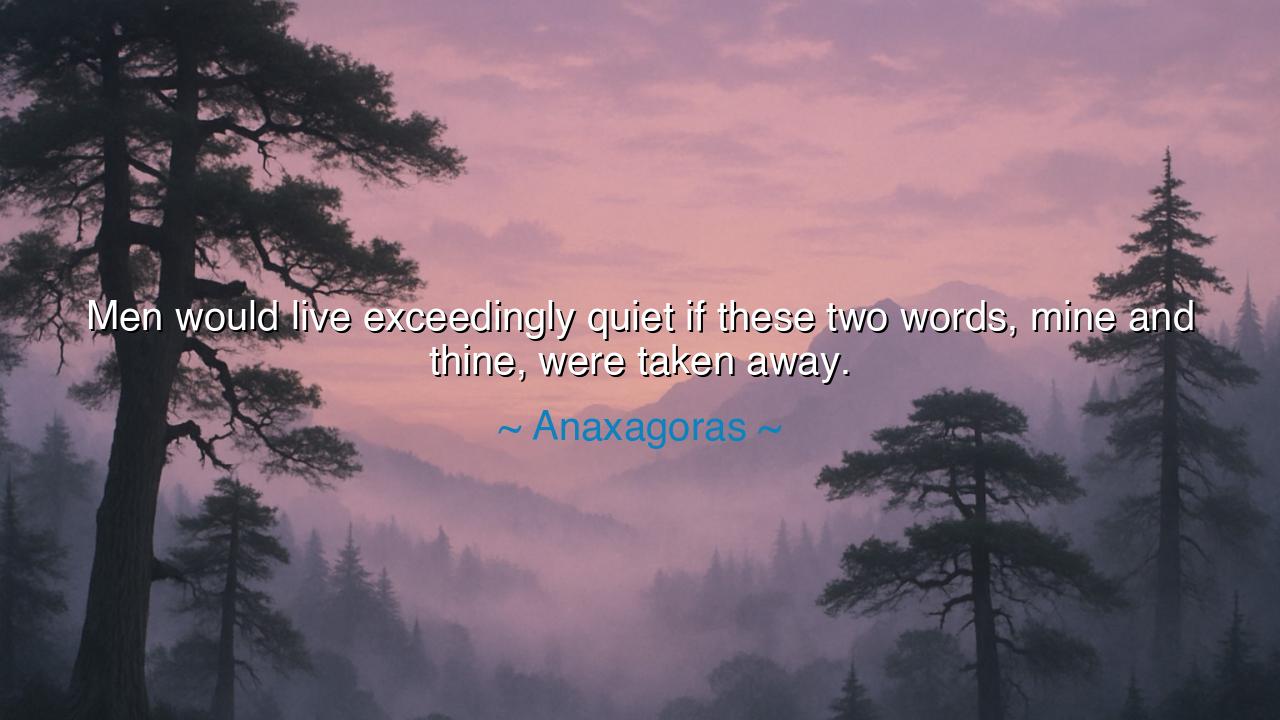
Men would live exceedingly quiet if these two words, mine and






Listen well to the ancient voice of Anaxagoras, who declared: “Men would live exceedingly quiet if these two words, mine and thine, were taken away.” These words, though simple, are filled with the weight of ages. They pierce through the surface of human striving to reveal the root of unrest. For it is not hunger that most often sets man against man, nor thirst, nor cold, but the fierce grip of possession—the endless dividing of the world into what is “yours” and what is “mine.”
In this saying, the philosopher shows us a mirror of the soul. The words mine and thine are not merely marks of ownership; they are the sparks that kindle jealousy, rivalry, and war. Brothers have quarreled over fields, neighbors over boundaries, nations over borders, and empires over dominion. In claiming, we create division; in dividing, we awaken strife. But if those words were erased, if men ceased to cling so desperately to possession, they would live, as Anaxagoras says, in “exceeding quiet”—a peace deeper than silence, born of freedom from grasping.
History is rich with stories that reveal this truth. Recall the early Christians in Jerusalem, of whom it is written: “They held all things in common.” There was no “mine” and “thine” among them, but a shared table and shared labor. In their fellowship, there arose a profound peace and unity that confounded the mighty Roman Empire. Though they were hunted, they endured with joy, for they had loosened their hands from possession and bound themselves instead to love. Their quiet was not idleness but harmony, a strength stronger than swords.
Contrast this with the tale of the Trojan War, born of a quarrel not over necessity but over possession—who had the right to claim Helen. That single spark of “mine” and “thine” brought forth ten years of slaughter, the fall of a great city, and the sorrow of countless households. How different might the world have been, had pride of ownership not ruled the hearts of kings? Thus Anaxagoras speaks not as a dreamer but as a prophet, warning us of the destruction hidden in those small but mighty words.
Yet his teaching is not a call to abandon all stewardship, for the earth itself requires that men sow, harvest, and care for what is placed in their hands. Rather, it is a call to loosen our hearts from greed, to see possession as service rather than dominion. What we hold should be for the good of all, not the chains of selfishness. For when the grasping hand relaxes, the soul is freed, and peace—“exceeding quiet”—descends.
The lesson for us is clear: beware the tyranny of “mine” and “thine.” In families, quarrels often rise over inheritance; in workplaces, rivalries over recognition; in nations, disputes over land or resources. Yet those who remember Anaxagoras’ words can rise above the strife. Practical wisdom follows: share generously, speak of “ours” more than “mine,” and in conflicts, ask not only what you can claim, but what you can give.
And so, my children, let this teaching endure: the quieter life is not found in possessions, but in freedom from them. The heart that loosens its grasp finds rest. The home where sharing is honored knows peace. The people who treasure unity above ownership become unshakable. May you walk in that ancient wisdom, and may your days be filled not with the clamor of “mine” and “thine,” but with the harmony of all things held in common.






AAdministratorAdministrator
Welcome, honored guests. Please leave a comment, we will respond soon